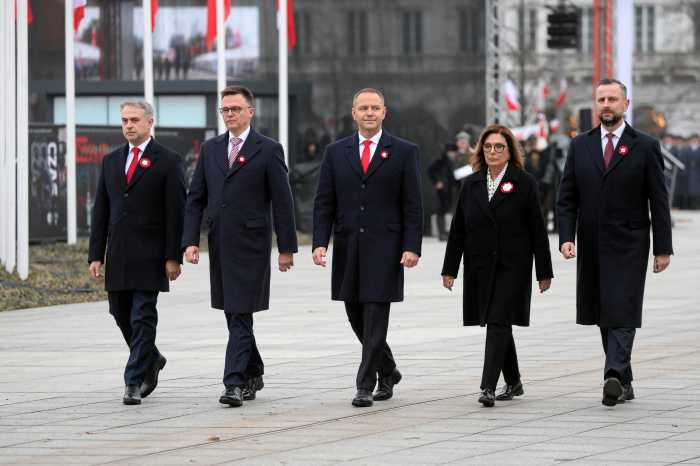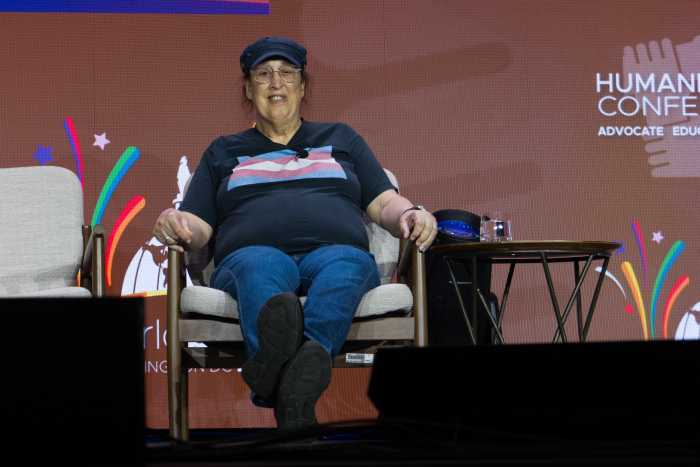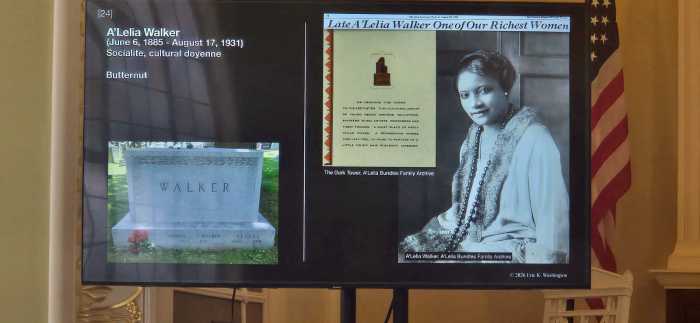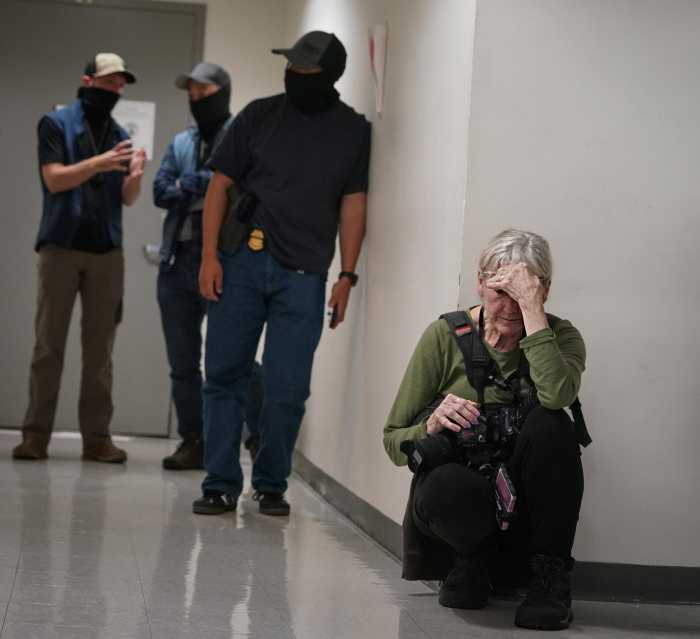Talented gay tennis player Habib Mukasa (known as “Habeeb”) was the sole Ugandan to participate in the Gay Games in Chicago this past July, when he decided to defect to the U.S. and applied for asylum from persecution as a sexual refugee.
Habeeb has played in tennis tournaments for the Gay & Lesbian Tennis Association for the last few years, in 2006 rising to fifth in the world in the GLTA Men's Singles ranking.
Unfortunately, Habeeb's father, a strict Muslim who did not know he is gay, saw the rankings online and found other evidence on the Internet of his participation in gay tennis tournaments around the globe-and reported his son's homosexuality to Ugandan authorities. Homosexuality is a crime in Uganda punishable by seven years in prison-and the country is in the throes of an anti-gay crusade (see this reporter's article, “Uganda Witch-Hunt Escalates,” in Gay City News, September 14-20, 2006). Not too long ago Uganda's president, Yoweri Museveni, ordered all gays and lesbians arrested for engaging in “abominable acts.”
After his father informed police that his son is gay, Habeeb's name was broadcast on the radio in Uganda and a warrant was issued for his arrest for homosexuality upon his return to that nation. Habeeb is currently awaiting a U.S. hearing on his asylum request.
Among the throngs of gay, lesbian, and transgendered individuals seeking a safe haven here from persecution in their home countries, Habeeb is one of the few lucky ones-because he has been able to secure top-flight, free legal representation to guide him through the bureaucratic nightmare and many roadblocks that face LGBT asylum seekers in the U.S. Habeeb's case is being handled pro bono by Gary Ross, an Atlanta-based attorney with the community services team of the Washington mega-law firm Holland & Knight, which has 1,200 attorneys and 18 offices worldwide. Representative Barney Frank, the gay Massachusetts Democrat, has praised the firm for being “in the forefront of the work on LGBT asylum seekers. I admire the diligence they've applied to the problem.”
“The system is broken,” said attorney Christopher Nugent, who heads Holland & Knight's community service team immigration-refugee program and has been working on LGBT asylum cases since 1994. He is considered by many to be America's foremost lawyer on gay asylum cases.
There are 75 countries that make same-sex relations a crime, but “showing that homosexuality is criminalized is not enough by itself for a gay person to be granted asylum,” explained Nugent, who added, “You must show that you yourself, as an individual, would be persecuted and targeted. Even proving that you are gay can be a big deal for asylum-seekers, who in addition often don't know they can benefit from psychological evaluations, or can't afford them. “
All this can often be a difficult burden, given the particularly stringent standards applied to asylum seekers since 9/11. Immigration officials and judges frequently exhibit paranoid fears that hoards of potential terrorists will infiltrate the U.S. by falsely claiming to be homosexuals.
Federal immigration statistics do not list applications based on sexual orientation persecution, but a study last year by Dusty Araujo, director of the Asylum Documentation Program for the International Gay and Lesbian Human Rights Commission (IGLHRC), showed that, of 4,500 cases, in only 600 were the LGBT applicants granted asylum.
And things are getting worse, not better.
The prospects for gay asylum seekers have seriously degraded since former Attorney General John Ashcroft “streamlined” the process in his post-9/11 “reform” of the system in 2002, Nugent told Gay City News.
“Ashcroft fired five of the 16 federal Immigration Judges, and changed the rules,” Nugent said. “Among those changes-only a single judge now reviews decisions by the Board of Immigration Affairs instead of a three-judge panel. Moreover, with only 11 Immigration Judges left after the Ashcroft firings, the immigration courts are overburdened.”
Not only that, but one's prospects for asylum depend on which Immigration Judge one's case is assigned to.
“It's called 'asylum roulette' by those of us who are legal practitioners on asylum cases,” Nugent said. “Judges are not anthropologists, and often have difficulty understanding the homophobic cultural context facing gays in countries where they are persecuted.”
And there's the problem of institutional homophobia here. Although the U.S. allows applications for asylum on the basis of persecution for sexual orientation, many immigration officials and judges display either serious ignorance of homosexuality or prejudice against it.
A study by the Immigration Project of the Transactional Records Clearinghouse (TRAC) at Syracuse University, released in August 2006, paints a depressing picture of “asylum roulette.”
According to gay New York Law School Professor Arthur S. Leonard, the resident Gay City News legal expert, the TRAC study shows that “some judges deny such applications from all but a tiny percentage of applicants, while most judges deny more than they grant, and a relatively small number grant most of the applications. It is clear from this study that the system as a whole violates the concept of Equal Protection of the law, which is guaranteed under the 14th Amendment to every person, not just U.S. citizens or legal residents. It is impossible, viewing the statistics, for anyone to claim that equal justice is being administered by the Immigration Judge corps.”
Unless an asylum-seeker is represented by an attorney-and two-thirds are not, according to the Washington Post-the chances of being granted asylum are slim. Government data shows that only 14 percent of those asylum-seekers without attorneys win the right to remain in the U.S.
And, since deportation proceedings are not considered criminal, asylum-seekers are not guaranteed the right to an attorney.
In any case, there simply are not enough experienced asylum attorneys willing to work pro bono to go around, so that many attorneys, law firms, and agencies who do work on such cases nonetheless frequently have no choice but to turn away requests for help.
But even if an LGBT asylum seeker has an attorney, that is often not enough.
“Many attorneys lack expertise in this area, or are under-prepared at trial level,” Nugent said. “We inherit a lot of cases after they've gone awry.”
A perfect example is the tragic case of Luis Fabriciano Rico, a gay refugee from Colombia who is now 29 and came to this country on a visitor's visa in 2001. In his asylum application, Rico said he had been targeted by the hostage-taking, drug-dealing Revolutionary Armed Forces of Colombia (FARC) because of his active membership in the Movement of Leaders in Action (MLA), youth arm of the Liberal Party, a social democratic party that is the nation's third largest and a member of the Socialist International. As rigid Marxist-Leninists, FARC has a particularly virulent hatred of social democrats.
Rico said FARC had threatened him and mistakenly murdered his nephew thinking that they were killing him.
In his application, Rico also specifically mentioned that members of the United Self-Defense Forces of Colombia (AUC)-an alliance of ultra-right-wing paramilitary groups-threatened and harassed him as well.
But Rico did not disclose at the time that he was being singled out by the murderous AUC thugs-who are ultra-homophobic and notorious for attacking gay people-because he is a homosexual. Rico was in dread that both U.S. immigration authorities and his original attorney, who was from Catholic Charities, would discriminate against him because he is gay.
Rico eventually got a new attorney who persuaded him he wouldn't be persecuted in the U.S. for being gay, and who tried to amend Rico's asylum to include new facts related to his sexual orientation and the problems it has posed for him.
Rico was a member of OASIS, an organization for LGBT Colombians living with HIV/AIDS, and a friend and of his who also belonged to the group, Jairo Ospina, was killed by AUC paramilitaries because he was on a blacklist of known homosexuals in their hometown of Barrancabermeja. Rico said he is also on this blacklist, and that AUC paramilitaries came to his parents' house on February 12, 2001 seeking to assassinate him, but did not find him there.
Despite this new evidence, an Immigration Judge denied Rico's asylum request because he was skeptical of his explanation about why he failed to claim persecution due to being gay in his original application. And an attempt to overturn that decision in court was denied by the 11th Circuit Court of Appeals in Atlanta.
Finally, the case was taken up pro bono by Holland & Knight attorney Leon Fresco, one of the lawyers on Nugent's team. He tried to get the Board of Immigration Appeals (BIA) to reopen Rico's case, based on significant new evidence of the degraded situation for gays in Colombia. Amnesty International and leading U.S. academics provided supporting testimony to show that the situation there had become even more dangerous for gays since Rico first applied for asylum.
Additionally, Fresco submitted a detailed psychological evaluation of Rico, who was diagnosed as suffering from Post-Traumatic Stress Disorder that had affected his ability both to help in preparing his own case and to be coherent and credible in his testimony before the Immigration Judge, to the detriment of his application.
The BIA denied the request to re-examine Rico's asylum claim, and Fresco is now back in court in the 11th Circuit, where Rico's case has languished since last May.
Rico's situation underscores the problems of asylum-seekers finding competent legal representation too late in their application process, but Nugent pointed out another critical obstacle they face-the absence of any grassroots mobilization on their behalf.
“I just don't think we have any institution in the U.S. that works to mobilize the gay community in behalf of gay people who've been victimized by the asylum process, the way that groups like OutRage in the U.K. do,” Nugent said regretfully, adding that “public campaigns can be very effective” in helping to win asylum for persecuted LGBT folk.
He's right about the lack of institutional support. A call to the Human Rights Campaign inquiring about any recent actions by the group on behalf of gay asylum seekers yielded the response, “That's just not something we do,” according to a press spokesperson. It's the same song at the National Gay and Lesbian Task Force, which pleaded, “It's not part of our mission, which is domestic, and we just don't have the resources.”
So, if you're from another country and seeking refuge from persecution on the basis of sexual orientation, the best advice for now might be-try Canada.
Doug Ireland can be reached through his blog, DIRELAND, at http://direland.typepad.com/direland/.

































